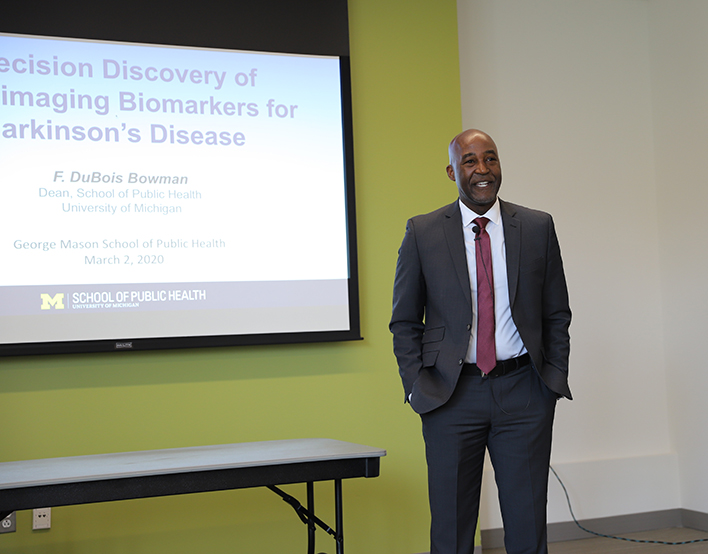
Dr. F. DuBois Bowman, professor and dean of the School of Public Health at the University of Michigan, was the fourth speaker in the College of Health and Human Services Dean’s Seminar Series. Bowman shared his research on precision discovery of neuroimaging biomarkers for Parkinson’s disease.
There are more than 10 million people globally with Parkinson’s Disease and more than 60,000 diagnoses each year in the United States. That number is expected to increase, in fact by 2020, we expect to have 930,000 adults 45 or older with Parkinson’s Disease, and more than 1.2 million by 2030.
Dr. F. DuBois Bowman, professor and dean of the School of Public Health at the University of Michigan, was the fourth speaker in the College of Health and Human Services Dean’s Seminar Series. Bowman shared his research on precision discovery of neuroimaging biomarkers for Parkinson’s disease (PD).
Bowman is part of the Parkinson's Disease Biomarkers Program, which is made up of researchers, patients, family members, and healthcare professionals who are dedicated to accelerating the pace of biomarkers research. This program provides funding for research, biorepositories, and data management resources to collaboratively build biomarker knowledge and resources.
“Our entry point in thinking about PD was in thinking about neuroimagery biomarkers,” explains Bowman, and most of his work has involved MRIs. His goal is to identify biomarkers that can assist in earlier diagnosis of PD.
Bowman and colleagues analyzed data from two studies – one that examined medicated PD patients, and the other unmedicated PD patients, both with control groups. They identified 150 million neuroimaging biomarkers per person. He explained that there are two ways to approach this amount of data – either with an exploratory large data approach or hypothesis-driven. His team took the exploratory approach, using machine learning to narrow down the biomarkers to 13 features that mattered. These 13 features were only present in the PD patients, but more work needs to be done before it can be applied in clinical (and particularly surgical) settings.
Bowman’s future research aims to predict the progression of PD in patients over one year and identify neuroprotective interventions to slow the progression of the disease.
